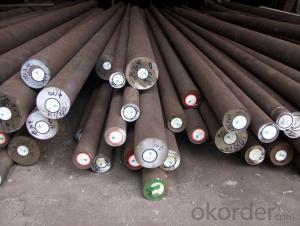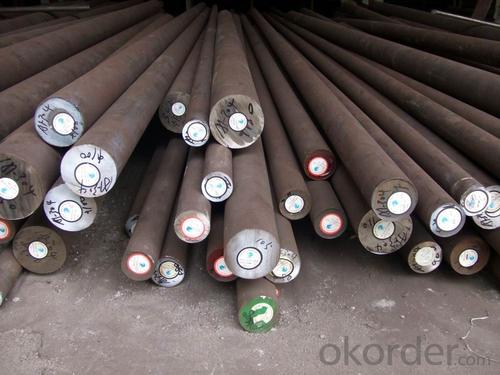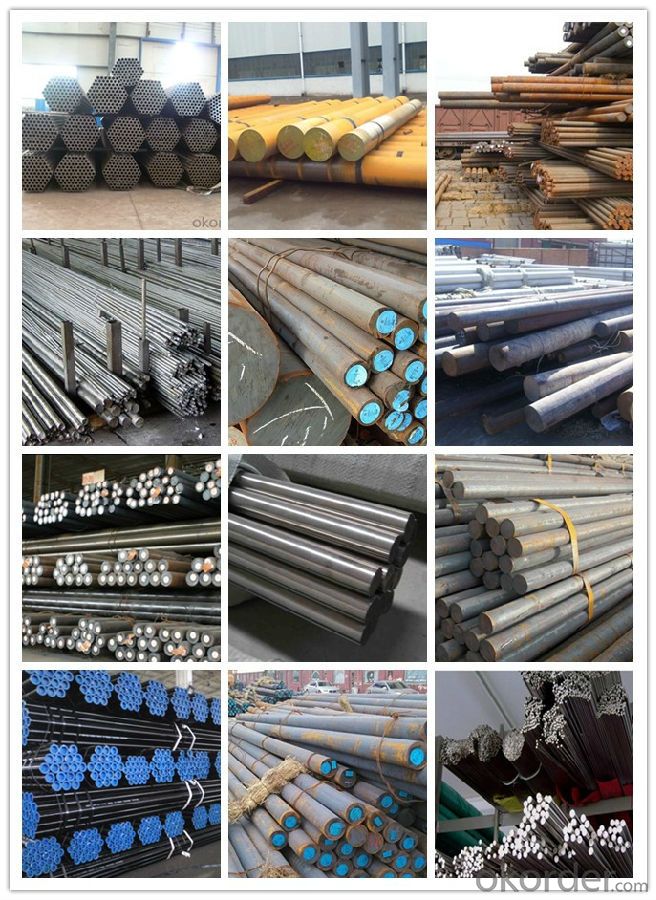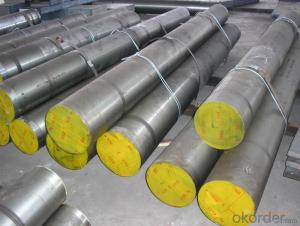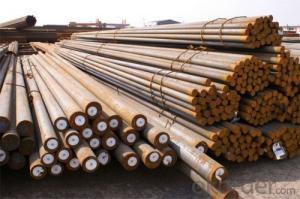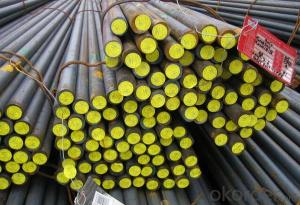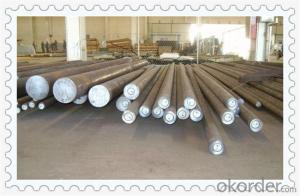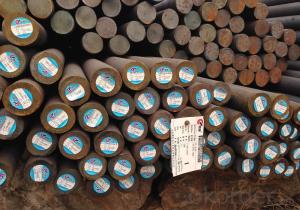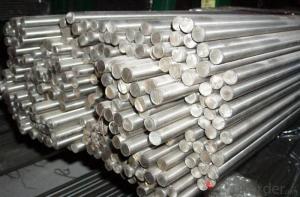Special Steel ASTM4140 Alloy Steel Round Bar
- Loading Port:
- China main port
- Payment Terms:
- TT OR LC
- Min Order Qty:
- 30 m.t.
- Supply Capability:
- 10000 m.t./month
OKorder Service Pledge
OKorder Financial Service
You Might Also Like
Specification
Product information
1. Grade: 4140,SAE4140, 42CrMo4, 1.7225,SCM440
2. Specification: Dia: 16~800mm Length:2000-13000mm or as required
3. Process: EAF+LF+VD
4. Technique:Forged
5.Treatment:hot rolled,cold drawn
6.Mechanical performance:
Strength of extension | 1080MPA |
Yield point | 930MPA |
Elongation | 12% |
Contractibility rate | 45% |
Impacting energy | 63J |
7.Chemical composition(for reference only):
Grade | C | Si | Mn | P≤ | S≤ | Cr | Mo |
SAE4140 | 0.38/0.43 | 0.15/0.35 | 0.75/1.00 | 0.035 | 0.035 | 0.80/1.10 | 0.15/0.25 |
8. Compared grades of 4140 steel
GB-China | AISI-America | DIN-GERMANY | JIS-Japan |
42CrMo | 4140 | 1.7225 42CrMo4 | SCM440 |
Product show
Workshop show
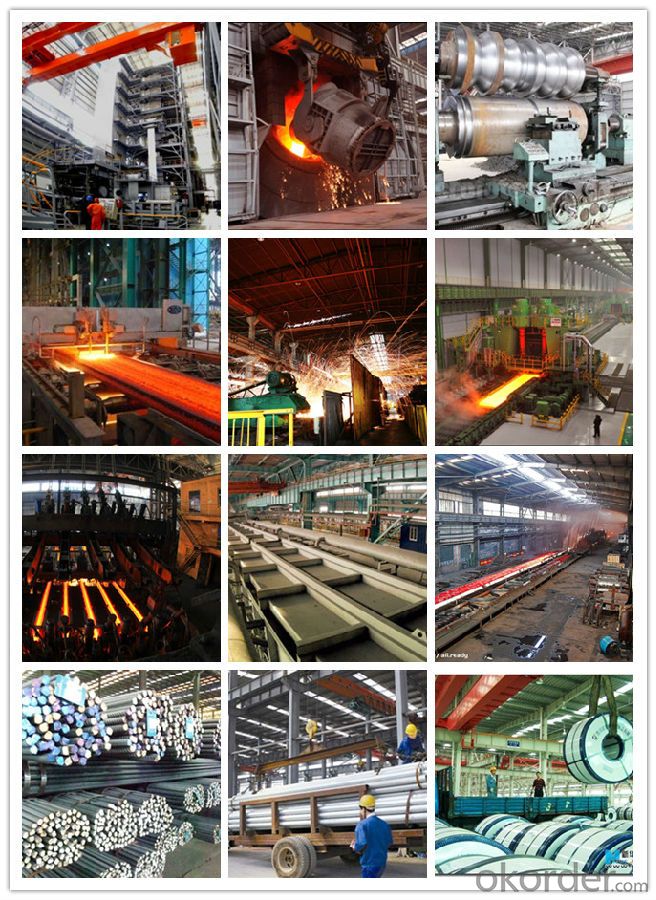
Shipping
1. FedEx/DHL/UPS/TNT for samples, Door-to-Door;
2. By Air or by Sea for batch goods, for FCL; Airport/ Port receiving;
3. Customers specifying freight forwarders or negotiable shipping methods!
Delivery Time: 3-7 days for samples; 5-25 days for batch goods.
Payment Terms
1.Payment: T/T, L/C, Western Union, MoneyGram,PayPal; 30% deposits; 70% balance before delivery.
2.MOQ: 1pcs
3.Warranty : 3 years
4.Package Informations: 1) EXPORT, In 20 feet (GW 25 ton) or 40 feet Container (GW 25 ton)
2)as customer's requirement
Why choose us?
(1) The leading exporter in China special steel industry.
(2) Large stocks for various sizes, fast delivery date.
(3) Good business relationship with China famous factories.
(4) More than 7 years steel exporting experience.
(5) Good after-sales service guarantee.
- Q: What are the different welding techniques used for special steel?
- Some of the different welding techniques used for special steel include TIG (Tungsten Inert Gas) welding, MIG (Metal Inert Gas) welding, and submerged arc welding. TIG welding is commonly used for stainless steel and allows for precise control and high-quality welds. MIG welding is versatile and can be used for a wide range of steel types, including special steel, providing fast and efficient welds. Submerged arc welding is used for thicker sections of special steel and offers excellent penetration and deposition rates.
- Q: Can special steel be used in the manufacturing of household appliances?
- Yes, special steel can be used in the manufacturing of household appliances. Special steel, also known as alloy steel, offers a range of desirable properties such as high strength, durability, and resistance to corrosion and wear. These characteristics make it suitable for various applications, including the production of household appliances. Household appliances such as refrigerators, ovens, dishwashers, and washing machines require materials that can withstand constant use, high temperatures, and exposure to water and chemicals. Special steel fulfills these requirements and provides a reliable and long-lasting solution. For example, stainless steel is a type of special steel commonly used in household appliances due to its corrosion resistance and hygienic properties. It is used in appliance components such as refrigerator doors, oven interiors, and dishwasher interiors. Stainless steel is easy to clean, maintains its appearance over time, and does not react with food or other substances, making it an ideal choice for household appliances. Additionally, special steel alloys can be used to enhance specific properties needed in different appliances. For instance, heat-resistant alloys can be utilized in ovens or stovetops, while high-strength steel alloys can be employed in appliances that require structural integrity, like washing machines or dryers. In summary, special steel can definitely be used in the manufacturing of household appliances. Its various properties, including strength, durability, resistance to corrosion, and versatility, make it an excellent material choice for ensuring the performance, longevity, and safety of household appliances.
- Q: What are the different methods of surface honing for special steel?
- Surface honing for special steel can be achieved through various methods, each with its own benefits and uses. Among the commonly employed techniques are: 1. Manual Honing: This approach entails the utilization of handheld honing tools, such as stones, sticks, or abrasive pads, to manually remove material from the steel's surface. Manual honing permits meticulous control and is often suitable for smaller or intricate components. 2. Machine Honing: Machine honing involves the use of specialized honing machines that automate the honing process. These machines typically feature rotating honing stones or abrasive belts, which eliminate material from the steel's surface. Machine honing is favored for larger or complex parts, as it ensures consistent and high-quality outcomes. 3. Diamond Honing: Diamond honing relies on diamond abrasives to eradicate material from the special steel's surface. Given that diamond is one of the hardest substances known, it is exceptionally effective for honing steel. This method is commonly employed in high-precision applications or instances where an exceedingly smooth surface finish is required. 4. Superfinishing: Superfinishing is a specialized honing process that achieves extremely fine surface finishes on special steel. It combines honing stones and abrasive pastes to remove minuscule amounts of material from the surface. Superfinishing is typically utilized in critical applications where surface roughness and dimensional accuracy are of utmost importance. 5. Lapping: Lapping is a honing method that employs a combination of abrasive particles and a rotating or vibrating tool to eliminate material from the steel's surface. It is particularly suitable for parts necessitating a very flat or parallel surface, such as bearings or sealing surfaces. 6. Electrochemical Honing: Electrochemical honing is a specialized process that employs an electric current to remove material from the special steel's surface. It is often employed for intricate or hard-to-reach surfaces, as it effectively eliminates material from areas inaccessible to other honing methods. To sum up, the various methods of surface honing for special steel encompass manual honing, machine honing, diamond honing, superfinishing, lapping, and electrochemical honing. Each method offers distinct advantages and applications, enabling precise control and the attainment of desired surface finishes and dimensional accuracy for special steel components.
- Q: How is stainless steel used in food processing?
- Stainless steel is widely used in food processing due to its hygienic properties, durability, and resistance to corrosion. It is used to manufacture various equipment and components such as storage tanks, piping systems, mixing tanks, cutting tools, and food preparation surfaces. The non-reactive nature of stainless steel prevents it from imparting any flavors or odors to the food, ensuring its purity and maintaining the quality of the final product. Additionally, stainless steel's smooth and easy-to-clean surface makes it suitable for maintaining high levels of hygiene, reducing the risk of contamination in food processing facilities.
- Q: What are the common grades of special steel?
- The specific application and desired properties determine the varying common grades of special steel. Some frequently utilized grades are: 1. Stainless steel, an alloy resistant to corrosion containing a minimum of 10.5% chromium. Grades like 304, 316, and 410 possess exceptional corrosion resistance, high strength, and good formability, making them prevalent in various industries. 2. Tool steel, specifically designed for toolmaking, renowned for its high hardness, wear resistance, and toughness. Common grades such as D2, A2, O1, and S7 possess specific properties suitable for diverse applications. 3. High-speed steel (HSS), a type of tool steel retaining its hardness and cutting ability even at high temperatures. It frequently finds use in cutting tools like drills, end mills, and taps. M2, M35, and M42 are a few well-known HSS grades. 4. Alloy steel, made by incorporating different alloying elements to enhance specific properties. Grades like 4140, 4340, and 8620, known for their high strength, toughness, and wear resistance, are commonly utilized in industries such as automotive, aerospace, and machinery. 5. Spring steel, renowned for its ability to restore its original shape after bending or twisting. Grades like 1095 and 5160 are commonly employed in the manufacturing of springs, suspension components, and hand tools. These examples merely scratch the surface of the numerous available grades of special steel, each possessing unique properties and applications. It is vital to select the appropriate grade based on the specific requirements of the intended usage.
- Q: How is duplex stainless steel used in the oil and gas industry?
- Duplex stainless steel is widely used in the oil and gas industry due to its exceptional corrosion resistance, high strength, and good weldability. It is commonly used in various applications including offshore platforms, subsea pipelines, oil and gas refineries, and chemical processing plants. The duplex stainless steel's ability to withstand harsh environments, resist corrosion from corrosive fluids, and perform under high pressure and temperature conditions makes it a preferred material for critical components and equipment in the oil and gas sector.
- Q: How does special steel perform in high-temperature oxidation?
- Special steel performs well in high-temperature oxidation due to its enhanced resistance to heat and corrosion. It exhibits superior strength and stability, retaining its mechanical properties even at elevated temperatures. Additionally, the presence of alloying elements like chromium, nickel, and molybdenum in special steel forms a protective oxide layer that prevents further oxidation. This makes special steel an ideal choice for applications requiring resistance to high-temperature oxidation, such as in aerospace, power generation, and chemical industries.
- Q: How does special steel contribute to the chemical resistance of products?
- Special steel, also known as stainless steel, contributes significantly to the chemical resistance of products due to its unique composition and properties. These steels contain a high percentage of chromium, which forms a thin, passive oxide layer on the surface of the steel. This oxide layer acts as a protective barrier, preventing corrosive substances from coming into direct contact with the steel and causing chemical reactions. The chromium in special steel forms a stable oxide layer that is highly resistant to corrosion, even in harsh chemical environments. This oxide layer is self-repairing, meaning that if it is damaged or scratched, it will quickly reform and continue to protect the steel. Additionally, the presence of other alloying elements such as nickel and molybdenum further enhances the chemical resistance of special steel. The chemical resistance of special steel extends to a wide range of corrosive substances, including acids, alkalis, and salts. This makes it highly suitable for applications in various industries such as chemical processing, pharmaceuticals, food processing, and marine environments. By using special steel in the manufacturing of products, the risk of chemical degradation and corrosion is significantly reduced. This leads to increased product lifespan, improved performance, and reduced maintenance costs. Furthermore, it ensures that the integrity and safety of the products are maintained, as chemical resistance is crucial in preventing leaks, contamination, and structural failures. In summary, special steel contributes to the chemical resistance of products by forming a protective oxide layer on its surface, which shields it from corrosive substances. Its unique composition and properties make it highly resistant to chemical degradation, ensuring the longevity and reliability of products in various industrial applications.
- Q: Can special steel be used in the medical field?
- Yes, special steel can be used in the medical field. Special steel alloys such as stainless steel are commonly used in medical devices and surgical instruments due to their excellent corrosion resistance, durability, and biocompatibility. These properties make special steel ideal for applications requiring cleanliness, strength, and resistance to body fluids.
- Q: How does special steel perform in high-temperature hydrogen environments?
- Special steel is known for its excellent performance in high-temperature hydrogen environments. It exhibits superior resistance to hydrogen embrittlement, corrosion, and material degradation, making it a suitable choice for applications where exposure to high-temperature hydrogen is prevalent. The steel's unique composition and heat treatment processes enhance its mechanical properties and enable it to maintain its structural integrity even in challenging conditions. Overall, special steel demonstrates remarkable performance and reliability when subjected to high-temperature hydrogen environments.
Send your message to us
Special Steel ASTM4140 Alloy Steel Round Bar
- Loading Port:
- China main port
- Payment Terms:
- TT OR LC
- Min Order Qty:
- 30 m.t.
- Supply Capability:
- 10000 m.t./month
OKorder Service Pledge
OKorder Financial Service
Similar products
Hot products
Hot Searches
Related keywords
